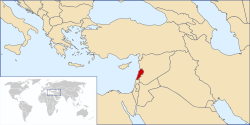Lebanon: Tribunal Obsession Ruining Hezbollah – Analysis
While the world’s attention is focused on Egypt, Libya and Syria, the Lebanese are still locked into their internal rivalries, quarrelling over the Special Tribunal for Lebanon that that this year blamed four Hezbollah figures for the 2005 murder of Lebanon’s former prime minister Rafik al-Hariri.
Hezbollah, leader of the March 8 Alliance, has cried foul play, claiming the tribunal is an “Israel and American project” aimed at tarnishing the image of “the Lebanese resistance”. The tribunal is an international court, based near The Hague in the Netherlands, and has a field office in Beirut, the Lebanese capital.
Precisely because then-prime minister Saad al-Hariri refused to distance himself from the tribunal, Hezbollah walked out on his cabinet in January. Hariri had fought relentlessly for the investigation since his father’s assassination six years ago.

Hezbollah made the distancing of Lebanon from the tribunal – politically, financially and legally – a prime condition of its support for Hariri’s successor, Najib Mikati. The new prime minister was asked to withdraw Lebanese judges from the United Nations-backed court and suspend Lebanon’s commitment to bankrolling it. To date, Mikati has responded negatively on “all of the above”.
The issue of funding resurfaced last Tuesday when it was incorporated into the 2012 Lebanese budget, as part of next year’s expenses at the Ministry of Justice. Hezbollah chief Hassan Nasrallah made it clear that the budget, as it stands, should by ditched by the government before it gets to the Lebanese parliament, where his opponents in the Hariri-led March 14 Coalition hold a majority.
That budget cannot pass before obtaining a majority of votes in the Mikati cabinet. Hezbollah will definitely say no to it, and so will its allies in government, the Amal movement of parliament speaker Nabih Berri and the Free Patriotic Movement (FPM) of General Michel Aoun.
By international obligations under United Nations Security Council resolution 1757 Lebanon is due to provide 49% of the tribunal’s running costs, which amount to more than US$30 million. During the weekly cabinet meeting on Wednesday, the Mikati team refrained from raising the issue or referring to the 2012 budget, given that an agreement has yet been reached with Hezbollah and its allies.
Last September, Mikati met with US Secretary of State Hillary Clinton at a Paris conference for Libya, where he was explicitly asked to uphold all of Lebanon’s commitments. Mikati, already accused of being too close to Hezbollah, had no choice but to say yes to Clinton.
He firmly believes that if Lebanon backs out on the tribunal, it would be shooting itself in the foot because the investigation will not stop if his government withdraws funding. On the contrary, all that would achieve is possible sanctions on Lebanon – whereas the required 49% could easily be provided by other states on the behalf of Lebanon, like Saudi Arabia, France or the US.
His view is shared by President Michel Suleiman and Druze leader Walid Jumblatt. One idea floating around the upper echelons of Beirut is to bypass the cabinet of ministers and parliament by passing a presidential decree, signed off by Suleiman and co-signed by the prime minister, finance minister and justice minister, authorizing payment of Lebanon’s share of the tribunal’s cost.
That would be difficult, however, because Justice Minister Shakib Qartabawi is a protege of Michel Aoun, and he has said that he would never approve funding for the tribunal.
By law, if a minister refuses to sign a decree, it could be signed instead by the deputy minister, who in this case is Walid Daouk, a Muslim Sunni. Sources close to Hezbollah have already warned that if this happened, the funding decree would carry the signature of three Sunni officials (Finance Minister Mohammad Safadi, Deputy Justice Minister Daouk and former prime minister Fouad Siniora).
This would spark off much tension within the Shi’ite community, since the tribunal is viewed as a public threat to the community’s Hezbollah heroes. It would be “very unwise” to go down that path, said sources close to Hezbollah.
Hezbollah earned much of its astounding reputation inside Lebanon for its ability to cater to the needs of its constituency, and fight the Israelis impressively on the Lebanese-Israeli border. The schools, hospitals and charity organizations dotted all over Lebanon are testimony to that, as is Hezbollah’s performance in the 2006 war with Israel.
In recent years, however, Hezbollah became over-involved in petty politics, distancing itself, perhaps unconsciously, from both feats. Additionally Hezbollah became obsessed, rather dramatically, with the Hariri tribunal, giving it a high priority over everyone and everything else in Lebanon.
In a recent meeting of Hezbollah’s top brass, Nasrallah called on them to use whatever means at their disposal to drown Lebanon’s funding of the tribunal, making sure, however, that they “preserve” Mikati as prime minister and refrain from brining him down, for now.
There are some voices in Lebanon, being a minority, who are calling for a Hezbollah trade-off with Mikati. They are proposing that Hezbollah approves the funding for now, in exchange for a pledge by Mikati to bring “false witnesses” to trial – men from Saad al-Hariri’s entourage who have been accused by Hezbollah of lying under oath and using the international investigation to implicate both Syrian and Hezbollah officials.
None of them to date have been apprehended, and nor have the four Hezbollah officials named in the tribunal’s bill of indictment.
Advocates of such a deal are saying that Hezbollah ought to sign off the funding for now, and work on terminating Lebanon’s commitment once and for all when its current obligation terminates next March, and require renewal by the Lebanese government.
Hezbollah has made it clear, however, that such a deal is “unacceptable” and it continues to abide by its rejection of the tribunal, in all forms, regardless of what this does to Lebanon as a whole, and their popularity rating in Lebanon, in particular.
This article appeared in Asia Times on October 13, 2011.
